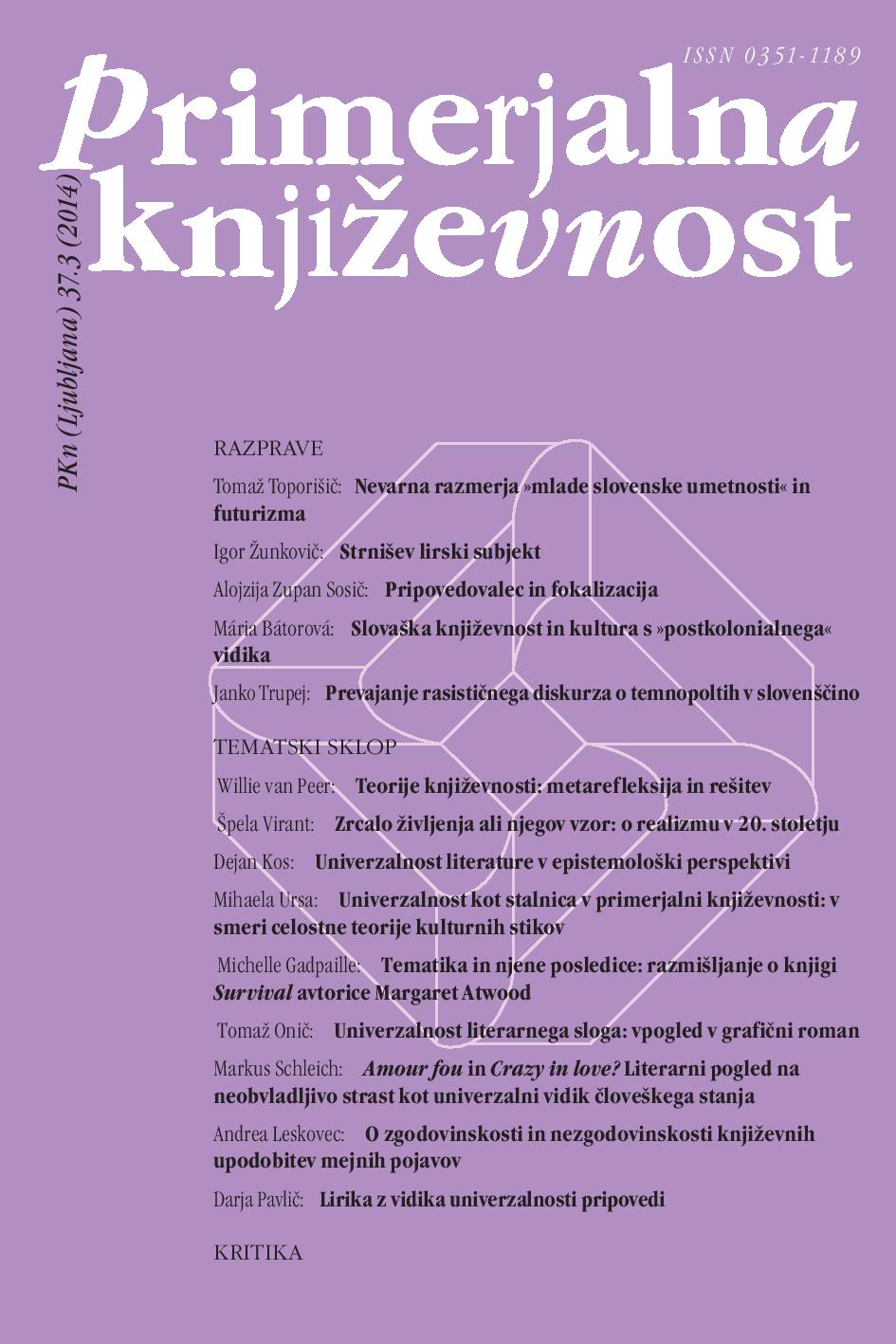Universality of Literature: Epistemological Perspective
Keywords:
literary science, epistemology, hermeneutics, empirism, semiotics, universalityAbstract
The paper examines the possibility of a literary-scientific foundation for the concept of universality. It establishes that the hermeneutical use of this concept is problematic in several respects: it is vague in defining its fundamental concept (unlimited validity), dismissive in relation to non-canonized texts, implicit with regard to the criteria of its own functioning and particular from the perspective of epistemological meta-reflexion. – In defining the concept of universality, the paper leans on the anthropological findings on the functioning of cognitive systems in conditions of mutual orientation; it seems that one of the fundamental characteristics of human evolution is the aptitude for social optimization of the cognitive system’s excess capacity. In this light, at least two interconnected communication mechanisms to which the status of literariness can be attributed prove to be universal: decontextualization and self-organisation. Their basic function is to ensure flexibility in the interaction with the environment. Various epistemological paradigms deal with this phenomenon and each of them conceptualizes it in accordance with its cognitive bases: the empirical paradigm recognizes it as self-determination, the symbolic paradigm as self-reflexivity and the semiotic paradigm as self-referentiality. – However, the issue of how to solve the problem of the universality of literature on the level of epistemological meta-reflection is a separate question. That is to say that from a historical perspective, the aforementioned findings appear only as one of the particular epistemological alternatives. The paper tries to solve this problem by considering the potential of literary mechanisms to their extreme consequences, and therefore to the transgression of rationality. Only by the realization of the extreme effects of decontextualization and self-organisation can we experience that we are not the origin of our own cognition and that the vacated core can only be filled with what we ourselves are not. This proximity can be found in the collective consciousness and the discursive practices of every culture. Only in this closeness can the sole absolute universality be attained – the one from which the universe arises.References
Agassi, Joseph. Science and Its History: A Reassessment of the Historiography of Science. Boston: Springer, 2008. (Boston Studies in the Philosophy and History of Science).
Beaugrande, Robert Alain de; Dressler, Wolfgang Ulrich. Einführung in die Textlinguistik. Tübingen: Niemeyer, 1981.
Bertram, Georg W. »Was die Kunst der Philosophie zu denken gibt«. Allgemeine Zeitschrift für Philosophie 34.1 (2009): 79–97.
Borges, Jorge Luis. »Averroesovo iskanje«. Izmišljije. Ur. Tone Pavček. Prev. Jože Udovič. Ljubljana: Cankarjeva založba, 1984.
Clark, Elisabeth A. History, Theory, Text: Historians and the Linguistic Turn. Cambridge, MA: Harvard University Press, 2004.
Derrida, Jacques; Attridge, Derek. »‘This Strange Institution Called Literature’: An Interview with Jacques Derrida«. Acts of Literature. Ur. Derek Attridge. London: Routledge, 1992. 33–75.
Dolinar, Darko. Hermenevtika in literarna veda. Ljubljana: DZS, 1991.
Dović, Marijan. Sistemske in empirične obravnave literature. Ljubljana: Založba ZRC, 2004.
Giddens, Anthony. The Constitution of Society: Outline of the Theory of Structuration. University of California Press, 1986.
Goldman, Alvin I. Simulating Minds: The Philosophy, Psychology, and Neuroscience of Mindreading: The Philosophy, Psychology, and Neuroscience of Mindreading. New York: Oxford University Press, 2006.
Juvan, Marko. »O usodi ‘velikega’ žanra«. Kako pisati literarno zgodovino danes? Ur. Darko Dolinar in Marko Juvan. Ljubljana: ZRC SAZU, 2003. 17–49.
Kenny, Anthony. A New History of Western Philosophy. Oxford: University Press, 2010.
Kocijančič, Gorazd. »Der Einzige und seine Kunst. Zur hypostatischen Theorie in der Rede über die Kunst«. Über das Geistige in der Kunst – zum zweiten Mal. Ur. Gorazd Kocijančič, Vid Snoj in Jožef Muhovič. Dunaj, Berlin, Münster: LIT, 2010. 11–30.
Kordeš, Urban. »Negovanje netrivialnega«. Primerjalna književnost 35.2 (2012): 41–52.
Kos, Dejan. »Transgresivnost v znanosti, humanistiki in literaturi«. Primerjalna književnost 35.2 (2012): 75–81.
Mithen, Steven. »Mind, Brain and Material Culture: An Archeological Perspective«. Evolution and the Human Mind. Ur. Peter Carruthers in Andrew Chamberlain. Cambridge: University Press, 2000. 207–217.
Roth, Gerhard. Fühlen, Denken, Handeln. Wie das Gehirn unser Verhalten steuert. Frankfurt ob Majni: Suhrkamp, 2003.
Rusch, Gebhard. »Zur Systemtheorie und Phänomenologie von Literatur«. SPIEL 10.2 (1991): 305–339.
− − −. »Fiktionalisierung als Element von Medienhandlungsstrategien«. Literaturwissenschaft als Wissenschaft über Fiktionalität. Ur. Christian Oberwagner in Collin Scholz. Szeged 1997. 123–138. (Studia Poetica 10).
Schmidt, Siegfried J. Grundriß der empirischen Literaturwissenschaft. Frankfurt ob Majni: Suhrkamp, 1991.
− − −. Kognitive Autonomie und soziale Orientierung. Münster: LIT Verlag, 2003.
Thompson, Evan, Antoine Lutz in Diego Cosmelli. »Neurophenomenology: An Introduction for Neurophilosophers«. Cognition and the Brain: Philosophy and the Neuroscience Movement. Ur. Andrew Brook in Kathleen Akins. Cambridge: Cambridge University Press, 2005. 40–97.
Varela, Francisco. Principles of Biological Autonomy. Boston: Kluwer Academic, 1979.
Virk, Tomo. »Aporije literarne zgodovine danes«. Slavistična revija 54.4 (2006): 811–831.


